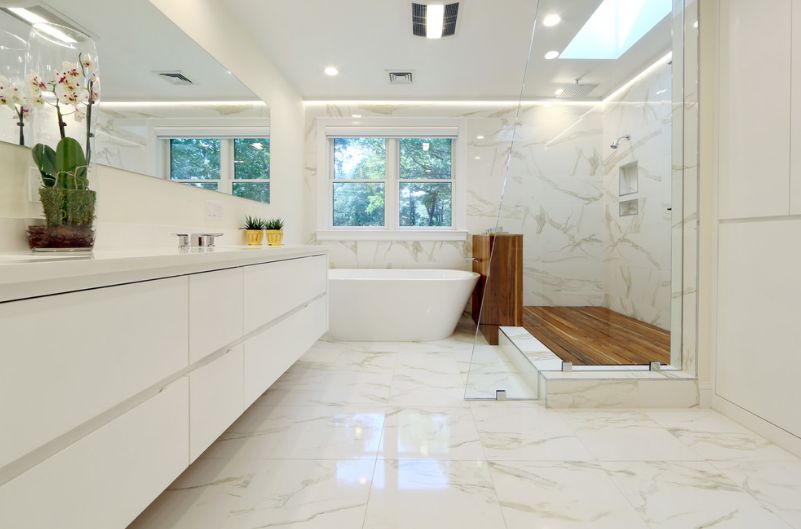A number of factors can cause unpleasant odors from the bathroom floor. These include poor ventilation, mold, and a clogged drain trap. Fortunately, there are simple solutions to eliminate these unpleasant odors from the bathroom floor.
According to BowlsEye, vinegar can be poured on the floor to effectively eliminate unwanted odors. The acetic acid in vinegar neutralizes the odor’s source and has disinfecting properties.
- Vinegar
When diluted with water, vinegar makes an effective all-purpose cleaning solution. In fact, the mixture is so versatile that it can also be used to clean wood surfaces such as cabinets and kitchen tables. In addition to being a natural and non-toxic cleaner, the acetic acid in vinegar can also help neutralize unpleasant odors. If the vinegar scent is too strong for you, try adding a bit of fresh herbs to the mixture, such as strips of lemon zest and thyme, which will mask the smell with their pleasant aromas.
If your bathroom smells of sewage, this is usually the sign of a clogged floor drain or a broken toilet wax ring. Odors may also come from a sewer gas vent that is located beneath the floor waste, which can be a problem if the water seal in the P-trap dries out. This can cause the sewer gases to escape through the grate, which is not only malodorous but also dangerous and even explosive.
Keeping the water seal in the P-trap is the best way to prevent odors from coming up through the drain. If the odors persist, consider using an enzyme-based drain cleaner such as Bio-Enzyme Drain Cleaner or Liquid Plumber Clog Destroyer Plus+ Pipeguard to dissolve, prevent blockages, and eliminate odors.
Essential oils are another natural and non-toxic solution for odors in the restroom. Tea tree oil, particularly, has antifungal and antibacterial properties that can effectively eliminate odors. Mix a few drops of the oil with water in a spray bottle and apply to the floor. The mixture will not only remove odors but also sanitize the surface.
- Baking soda
Baking soda is a natural cleaning agent that is non-toxic and safe to use on floors. It absorbs and neutralizes odors, making it a great choice for smelly bathroom floors. It also dissolves hard-water deposits and helps prevent clogs. It can be used as an alternative to commercial cleansers that can damage some metals, such as chrome and bronze. A baking soda and water paste works well to remove stubborn mineral buildup from showers and bathtubs.
Another way to use baking soda for smelly bathroom floors is to sprinkle it around the edges of the bathtub, where the sealant is often damaged or worn away. This will help keep the water from leaking into the walls and creating a damp, musty odor.
The granules of baking soda are light enough to easily dislodge food particles that have lodged in sink drains. They can also be sprinkled on ice to provide traction and melt the ice quickly. Baking soda is also useful as a replacement for rock salt, kitty litter, or sand when ice forms on outdoor steps.
A natural deodorizer, baking soda, can help eliminate the odors caused by sweat and urine. Sprinkle a thick layer of baking soda on the floor and let it sit overnight. Then sweep or vacuum it up. This can be repeated as needed to get rid of persistent odors.
Baking soda can also be added to the toilet water to clean and deodorize it. It reacts with grease and grime to form glycerol, which helps break down and wash away the residue. Its pH is also about 9, which makes it a good substitute for chemical toilet cleaners that can discolor and damage porcelain.
- Boiling water
Several things can cause the smell of smelly bathroom floors. One common cause is a drain clog. Grease, soap scum, hair, and other organic matter can build up in the drainpipe, creating a slimy biofilm that traps odor-causing microorganisms. Clogged drains should be cleaned promptly to prevent odors and slow drainage.
Another common cause of smelly bathroom floors is a septic system leak. This can cause sewage to back into your home, leading to foul odors and structural damage. A leaking septic tank should be repaired promptly to avoid sewage backup and sewer odors.
A dripping showerhead or a leaky pipe may also cause unpleasant odors on the floor. This is because water can seep into the walls and flooring, causing mold or mildew to grow. This is why it is important to regularly check your plumbing and replace parts as needed.
One of the easiest ways to eliminate a foul bathroom odor is to pour boiling water down the drain. The heat of the boiling water will break down any accumulated grime and help to eliminate odors.
If the smell comes from a drain, you can use a few cups of boiling water to flush it and recreate the water seal. You can also try pouring baking soda and vinegar down the drain to break down the odor-causing bacteria. You can also use a chemical drain cleaner, but following the safety instructions carefully and wearing gloves and eye protection when using these products is important. If the odor persists, you may need to call a professional plumber to investigate further. They may suggest a toilet pan collar that will conceal the deterioration of the drain trap and prevent the leaking of sewer gases into the home.
- Essential oils
Essential oils can also be used as a natural cleaning solution, especially when they have antibacterial, antifungal, and antimicrobial properties. This makes them an effective and safe alternative to chemical-based cleaners that can cause harmful side effects when inhaled or ingested. When choosing an essential oil, look for a 100% pure and organic brand. You should also check the label to ensure that the ingredients list only the oil and no other additives or preservatives. A few drops of the right essential oil can clean, disinfect, and freshen your bathroom floors in a way that is safe for you and your family.
For example, thyme oil is an effective mold and mildew eliminator with a calming scent. Add a few drops to your mop water, and your smelly floors will be as good as new! Cinnamon oil is another great option, as it eliminates odors while creating a warm and cozy atmosphere. It also repels pests, so it’s perfect for your kitchen as well!
Finally, eucalyptus oil is a very effective deodorizer. It has a beautiful, soothing smell and is often used in beauty treatments and spas. It can be added to your mop water along with lemon for a refreshing and invigorating scent.
If a clogged or stinky floor drain causes smelly bathroom floors, try pouring boiling water down the drain to remove any sediment or bacteria that has formed a slimy biofilm. You can also use a drain cleaning solution or a pipe auger to clear out any clogs causing the smelly floor drains. Alternatively, you can install tiled floor waste with a seal that will prevent odors from building up in the drain trap.
- Chemical cleaners
A disinfectant cleaner with bacteria-eliminating properties can be used as a more intensive and quick way to eliminate smelly bathroom floors. These cleaners typically contain chemicals that kill germs and odors at the same time, but be sure to use appropriate safety precautions, including wearing gloves and eye protection, when using any chemical cleaners. Ensure proper ventilation during and after cleaning, and always keep the windows open.
Occasionally, the floor drains in restrooms can emit foul odors due to the buildup of hair, soap scum, and bodily fluids on the bottom of the trap. When this sludge dries out, it can create a dry seal that allows sewer odors to escape into the bathroom. To prevent this, regularly pour a few cups of water into the drain to recreate the water seal.
A clogged toilet can also emit foul odors, as it can block water and waste from flowing through the plumbing system. This is often caused by a broken wax ring or a loose connection between the toilet flange and the base of the tank. A quality drain cleaner like Liquid-Plumr Clog Destroyer Plus+ Pipeguard dissolves clogs, eliminates odors, and keeps your toilets draining properly.
Smelly restroom floors can majorly impact a business’s reputation for cleanliness and cleanliness standards, leading to more complaints, fewer repeat customers, and even negative reviews. Fortunately, there are many simple and easy ways to prevent and eliminate smelly bathroom floors, such as using baking soda, boiling water, and essential oils. Following these tips, you can keep your bathroom floors clean and smelling fresh all year round!




